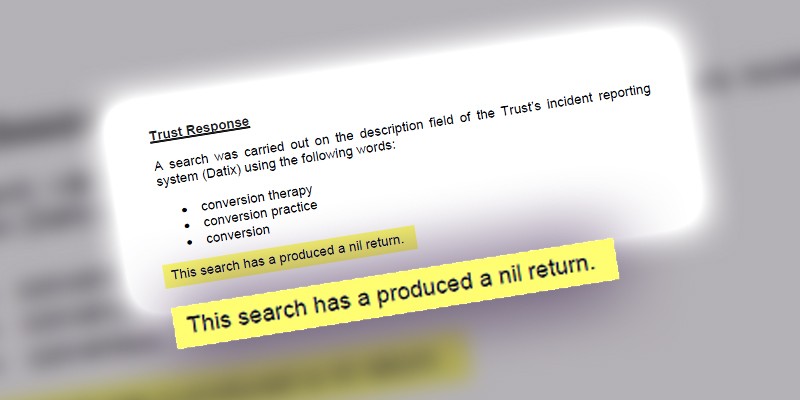
FOI responses debunk claims of ‘conversion therapy’ problem in Northern Ireland
Despite LGBT activist claims of widespread abuse, Northern Ireland’s healthcare system has received virtually no complaints about so-called ‘conversion therapy’, newly released FOI data reveals.
A new set of Freedom of Information (FOI) responses has dealt a major blow to the campaign for a law.
All but one of Northern Ireland’s Health and Social Care Trusts—along with every official body responsible for handling healthcare complaints—have confirmed they’ve received no complaints about ‘conversion therapy’. The sole exception, the Belfast Trust, reported receiving “fewer than five” complaints, and even then, it concluded that “no concerns were identified relating to clinical treatment or care”.
That’s it. No flood of abuse. No hidden epidemic. Just a quiet ‘no issue we’re aware of’ from the bodies entrusted with safeguarding public health.
A law with no evidence?
These findings raise serious questions about the push for new legislation in NI, spearheaded by Alliance MLA Eóin Tennyson. His proposal mirrors controversial plans from the Scottish Government that were ultimately shelved in late 2024, following public backlash and legal concerns. Those plans were roundly criticised for threatening free speech, criminalising prayer and pastoral care, and undermining parental rights.
Let Us Pray’s James Kennedy explained that the FOI revelations confirm what we have long argued: “there is simply no need for a law on so-called conversion therapy”.
Politicians should be guided by real evidence, not activist pressure. “Instead of asking our Health and Social Care Trusts that handle these issues, some MLAs have blindly accepted the incorrect claims of a handful of activists as fact”,he said.
“Many have justified a new law as a necessary intervention on pseudo-medical interventions, but these stopped generations ago. These new FOIs from the Health Trusts show there is no sign that harmful practices are taking place in Northern Ireland today.
“If, however, a new law is not intended to tackle medical practices, then the public would be right to be very wary of what it really does intend to curtail. The truth is that a new law on conversion therapy would infringe on the freedoms of ordinary, innocent people who reject LGBTQ+ ideology. It would impact especially Christians who seek to uphold biblical teaching on marriage and gender, and parents who caution a child against gender transition.”
Stonewall's claims don’t live up to reality
The absence of real complaints is particularly striking in light of recent claims by LGBT activist group Stonewall. Using the results from a recent survey, Stonewall bizarrely claimed that 31% of people who identify as LGBT in Great Britain (not Northern Ireland) had experienced ‘conversion therapy’. Perhaps most startling was the same survey’s claim that over 8% had undergone exorcisms in the past five years—an assertion that would apparently amount to around 24,600 exorcisms annually.
Critics have pointed out the absurdity of such figures, especially given that fewer than 42,000 church marriages take place in the UK each year. Stonewall’s figures also clash sharply with the UK Government’s own National LGBT Survey, which found only 2% of respondents claiming to have had experiences of conversion therapy—a figure already criticised for not being limited to recent or local experiences.
Despite the apparent unreliability of Stonewall’s data, its claims have been used by some to justify sweeping new laws. But when fewer than five complaints have been made to healthcare bodies in Northern Ireland, that argument falls apart entirely.
Rainbow Project report undermines case for new law
NI’s main LGBT charity The Rainbow Project published a 2024 report into ‘conversion practices in Northern Ireland’, which also fails to provide compelling justification for new legislation.
Commissioned by the Northern Ireland Executive, the report relies on just ten personal accounts. Some of the testimonies only mention ordinary religious activities such as prayer and Bible study – activity that could never warrant criminalisation.
In one of the very few accounts dealing with transgender experiences, a participant described how they were unhappy with an autism diagnosis from their doctor. It’s unclear precisely why they thought this amounted to ‘conversion therapy’, but they felt the doctor should have focused on their gender identity claims.
The researchers appear not to have sought the insight of medical professionals. They simply assert that there is a problem because the activists say there is one. Yet none of the cases they presented suggest a new law is needed to tackle abusive practices.
Political commentator James Esses investigated the research process and found that although the researchers had planned to interview 15 people, they gave up at ten, unable to find any more stories to report. They apparently returned their advertising budget, having exhausted their reach.
“Those calling for a new law would have us believe that thousands are impacted. The researchers ran out of steam at a mere ten”, Esses wrote.
Sign up to the Let Us Pray campaign for updates - join the campaign.
See also: Top KC: Alliance conversion therapy proposal beyond Stormont powers
Sex Matters responds to Stonewall’s ludicrous “conversion” claims
2025-05-14 07:17:58
